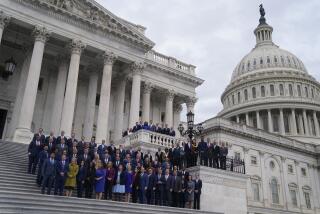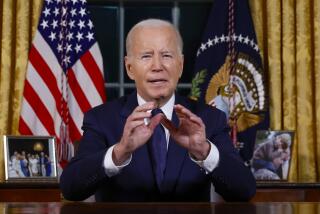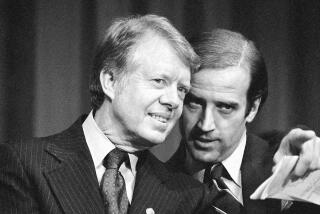Americans, Yes, but World Citizens, Too
- Share via
WALTHAM, Mass. — “Throughout my public career,” President Lyndon B. Johnson once said, “I have followed the personal philosophy that I am a free man, an American, a public servant and a member of my party, in that order always and only.”
In the wake of the Sept. 11 tragedies, Americans have shown their patriotic colors. But, as Johnson made clear, patriotism does not require us always to put our national identity first when considering the various roles we play in the world. Our commitment to country is always stronger when it complements and builds upon other commitments. In the 21st century, we should expand Johnson’s list to include our role as citizens of the world.
Americans, after all, are not only Americans. We also belong to a global community.
Americans tend to shy away from thinking of themselves as global citizens. For all our bravado, we are insecure about the depth and the power of our national identity. We worry that something essential to the American character will be lost if we dilute our national feeling with too much commitment to the international.
Global citizenship and patriotism need not compete. Indeed, the one is bound to enrich the other. If we think deeply about the United States and its place in the world, we are bound to think more creatively and more deeply about which aspects of our country matter most to us.
Here are four ways in which we might begin.
First, we can recognize that the sense of suffering, grief and fear we’ve felt so intensely in recent weeks is not uncommon around the globe. Violence on a catastrophic scale is a new experience for most Americans alive today, but it is all too familiar to many people around the world. We miss a vital opportunity for establishing strong bonds across oceans when we neglect to think of our losses as a part of a larger contemporary human tragedy.
Second, we might extend this sense of connection with the fears and passions of others by toning down the constant--and very public--celebration of our national destiny and greatness. It was natural for us to react in the immediate aftermath of tragedy with the swollen rhetoric of injured pride: Our enemies attacked us because we are so strong and so good, we will triumph because no national spirit matches our own, and other similar sentiments.
The time has come to scale back our self-righteousness. Our enemies never bought our assertions of American greatness. Our friends, however, even our closest allies, are beginning to resent our self-importance. Efforts to build a global coalition are bound to be more fruitful if we approach potential partners, not as a swaggering savior, but as fellow citizens of a world in peril.
Third, thinking of ourselves as global citizens can dissuade us from making the glib assumption, underlying one leading edge of patriotic fervor, that “American values” represent the pinnacle of political and cultural ideals. I agree with those who believe that freedom and equality have flourished in the United States to a much greater degree than they have in most other parts of the world. But since we argue among ourselves about the meaning, the priority and the implementation of these ideals at home, we should expect and welcome vigorous debates about the goals of human society in an international context. And we should respect the international organizations and institutions that embody those contested universal ideals. International courts have already played a significant role in helping the world come to terms with atrocities in the former Yugoslavia and in Rwanda. Americans have been reluctant to support a strong international justice system, but without one, we now lack a crucial element in the struggle against terrorism.
Fourth, and most important, we must recall the essential duty of any patriot: the task of careful, penetrating national self-criticism. This not a matter of tolerating dissent, which we already do reasonably well.
I am speaking of something grander than permitting expressions of outrage: I mean to suggest a collective effort to use the perspective of global identity to reflect on our values, our language and our actions. A consistent effort to see ourselves from outside ourselves paves the way for actions that are considered and collaborative.
The patriotism that emerges from this dialogue will not just be about flags and parades. If we take an active role in making and remaking American ideals and aspirations, if we talk candidly about our nation’s weaknesses, as well as its strengths, we will find it easier to persuade our friends abroad to join with us in causes that matter, and we will find it easier to sustain strong national feeling across the widest spectrum of the American public. That patriotism will flourish, because it is not something static, not something that has simply been handed to us. Global commitment will make America stronger, precisely because it will make us humbler.
More to Read
Get the L.A. Times Politics newsletter
Deeply reported insights into legislation, politics and policy from Sacramento, Washington and beyond. In your inbox twice per week.
You may occasionally receive promotional content from the Los Angeles Times.










